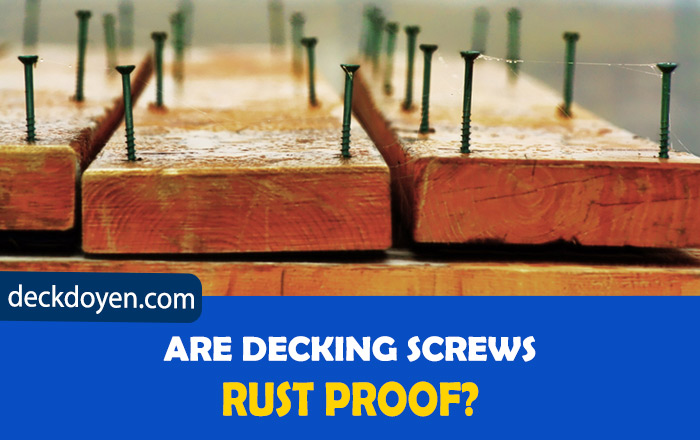When you install a deck, you want and expect it to stand the test of time. As deck screws hold the structure together, homeowners find it necessary to maintain their strength. One big problem that you might face in this regard is rusting, which reduces the fastener’s performance.
If you are using deck screws for the first time for your construction project, your biggest concern would be to avoid corrosion. It might make you wonder, are decking screws rust-proof or not?
Deck screws are not entirely resistant to rust and corrosion. Stainless steel screws provide maximum protection against rusting but are an expensive option. Galvanized screws have a zinc coating that makes them resistant to oxidation. The coating can wear off over time, but they are affordable.
As deck screws get used outdoors or in moist environments, they are prone to rust and damage. Having so many fasteners options at a hardware store, you should know which one is the right choice for your deck to avoid rusting. Let’s find out more!
Also Read: Can Deck Screws Be Used For Framing?
Will Deck Screws Rust; Why Or Why Not?
The role of picking the correct screws is much more significant than you might think. Whether you plan to build a deck or repair and maintain it, you might want to use fasteners that give the best performance. Moreover, as they are exposed frequently to moisture and downpours, the deck screws you use should be able to withstand rust and corrosion.
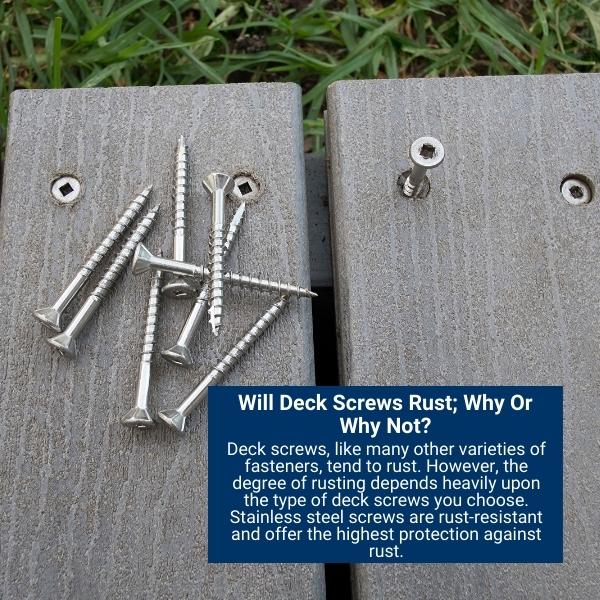
Deck screws, like many other varieties of fasteners, tend to rust. However, the degree of rusting depends heavily upon the type of deck screws you choose. Stainless steel screws are rust-resistant and offer the highest protection against rust. Galvanized and zinc screws, on the contrary, have a rust-proof coating layer that prevents them from losing their strength once installed. But, this coating can wear off with time.
Thus, to keep your out projects like deck protected against rusting, you need to opt for appropriate deck screws that will resist wet weather conditions.
What Leads To The Rusting Of Deck Screws?
When the metal inside the deck screws gets exposed to moisture and air, it will lead to rusting, just like other metal fasteners. Some other factors that may also contribute to the initiation of the rusting process include water and salt.
It is a frequent problem that many homeowners face, and it often seems impossible to avoid. As screws are created commonly from metal, and almost every place has some contact with rain or moisture, it can be challenging to overcome this situation. However, once you figure out what kind of deck screw will work in your deck location, you can minimize the occurrence of rust and corroding.
Also Read: What to Put Under the Deck for Moisture? 6 Different Options
What Type Of Deck Screw Has The Most Rust-Resistance?
Stainless steel screws offer the highest resistance against rust when it comes to protection. Many people opt for this option because these screws are made entirely of rust-proof material and not just an external coating. So, unlike other fasteners, stainless screws do not possess a risk of losing away their layer after prolonged use. As an outcome, they will last longer than galvanized screws.
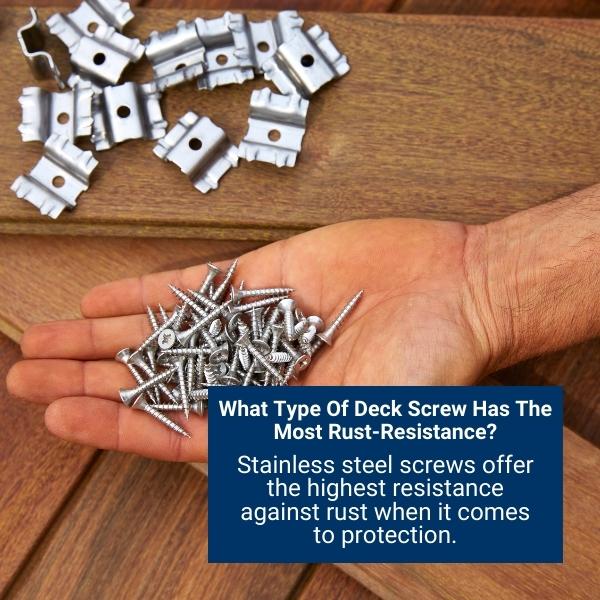
If you live in a region prone to extreme rain showers and humidity, stainless steel screws will be the ideal pick for you. They also have different grades that can provide more or less protection against rust, depending upon the environment you have chosen to install your deck.
However, stainless steel screws cost almost double that of galvanized screws, increasing the construction and maintenance budget. So, they might not be an ideal choice if you want to lower the construction cost.
Are Galvanized Deck Screws Rust-Proof?
Galvanized screws are less expensive compared to stainless steel screws, making them a good option. These fasteners are also resistant to corrosion because they have a thick layer of zinc coating. This external zinc layer prevents the iron from reacting with the oxygen and water in the air. As a result, it gives no room for the rust problem to even begin in the first place.
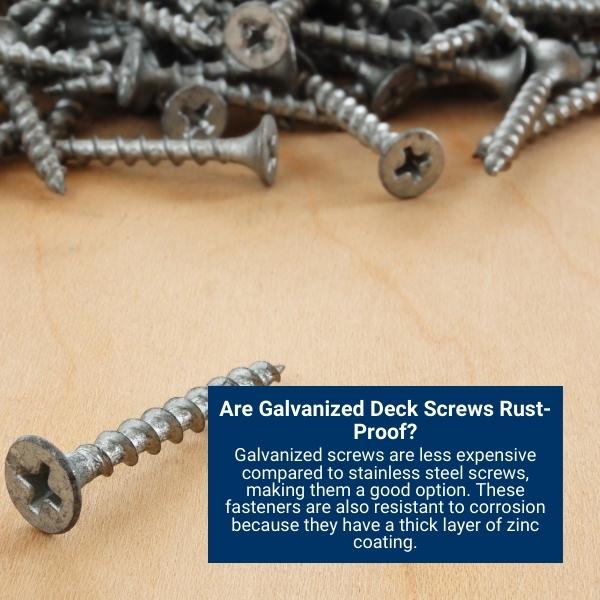
Galvanized screws are a widely popular choice among homeowners, considering the qualities of corrosion resistance and affordability. But, the outer coating can wear out, exposing the inside of the screw that is susceptible to corrosion and rusting. They are not as long-lasting as stainless screws and can last for about 10 to fifteen years in moderate conditions.
Also Read: Deck vs. Interlock: Which One To Use and Where?
How Can You Protect Deck Screws From Rusting?
There are a few ways that can prove helpful to prevent the deck screws from rusting. Firstly, you must use the right screws for your decking project. If you are not worried about the budget, it is ideal to opt for stainless steel screws. It is because they offer maximum resistance against rust. Zinc-coated deck screws may not survive long in a harsh environment.
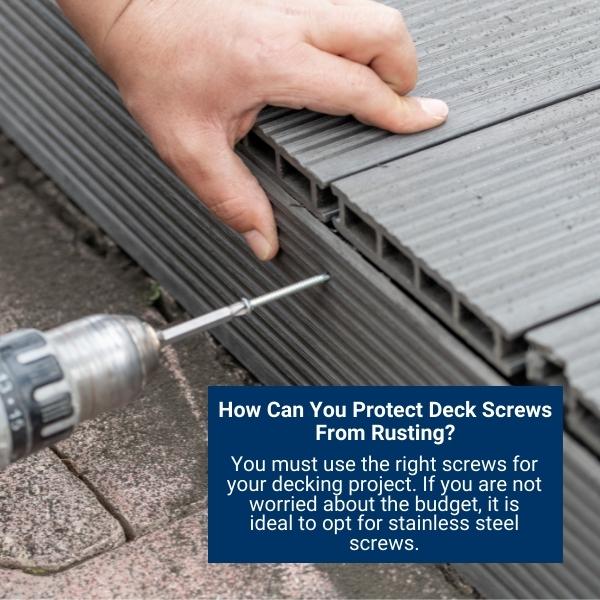
But, if you have already used other deck screws in place of stainless fasteners, there is no need to worry. You can increase the rust resistance of your screws for a temporary period by applying a coating of grease or rust inhibitor to them. For this purpose, you can use paint, oil, and even petroleum jelly.
Another thing to remember is that you need to select deck fasteners suitable for your deck material. For instance, if your deck is made of pressure-treated wood, then using screws that are not appropriate for this type of wood will eventually result in corrosion.
Final Thoughts:
To conclude, deck screws can develop rust and corrode with time. Nevertheless, there are many deck screw types, and not all are the same. Stainless steel fasteners are super corrosion-proof and will last as long as your deck does. The more affordable option, like galvanized steel, is also resistant to rust but will disintegrate over the longer run, especially in a harsh outdoor environment. Thus, you have to be extra careful while selecting a deck screw. Fasteners with the highest degree of rust resistance are significantly more expensive than those with lower protection.
Also Read: How To Lay Decking On Grass

